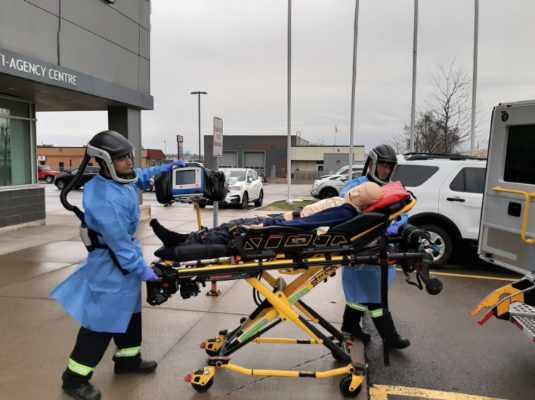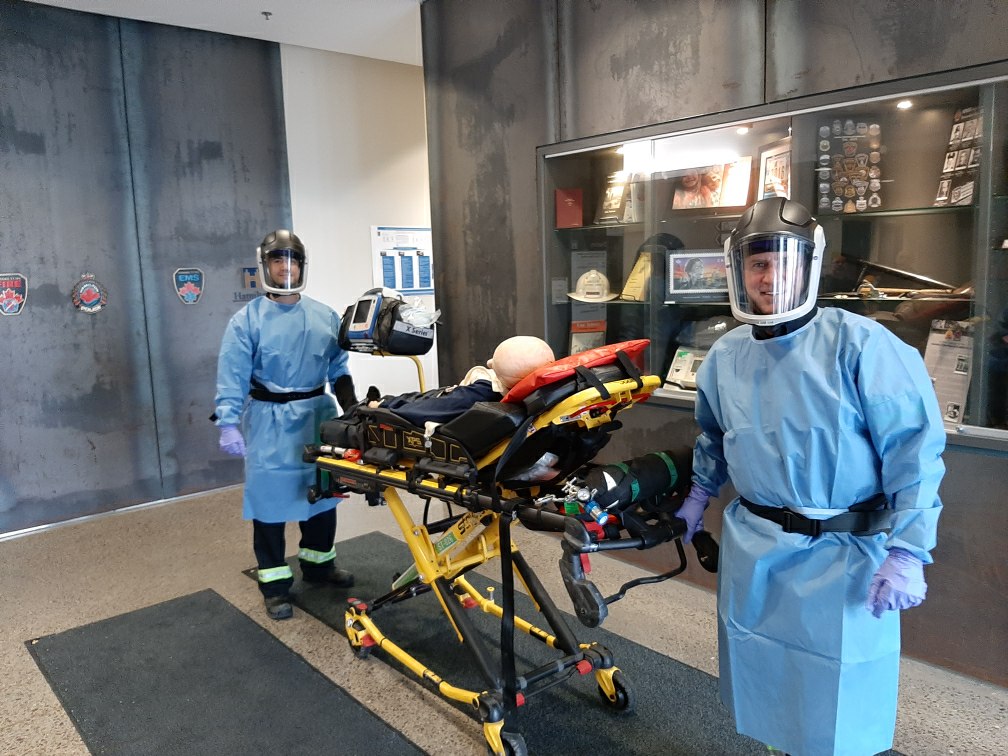A new 12-person team of infectious disease paramedics – tasked with caring for patients who have screened positive for the novel coronavirus – are on the job as of the weekend, according to the superintendent for Hamilton’s paramedics.

Dave Thomspon told Global News the volunteers from the EMS unit will now be the primary responders to COVID-19 patients and also provide inter-facility transfers of patients connected to the virus to medical facilities in the city.
“If they’re in the city and we do get a positive screen from our dispatch then this unit, if they’re closest and most appropriate, we’ll be responding to that call,” said Thompson.
The team, which went through weeks of advanced training to learn more about the spread of the virus, will also respond to calls connected to patients with airway obstructions.
At the centre of the team’s PPE is powered air-purifying respirators (PAPR), which feature a full face mask, breathing tube and a battery-powered blower that provides airflow through a filter cartridge.

“We went with a helmet because it provides a little bit more comfort for the paramedics are doing it and it has a face shield as opposed to a proper hood, which has a little bit of a limited vision field,” Thompson said.
The need to keep the entire paramedic unit safe was also the motivation behind the new team, according to Thompson, since the latest city data reveals that paramedics are averaging 30 COVID-19 calls per 24-hour period that require transport to a hospital.
Thompson says there have definitely been changes to the routines of EMS staff since the novel coronavirus pandemic started, particularly with front-line workers going home to friends and family.
“There’s some people that unfortunately have to distance themselves from family, change the routine when they get home, like taking clothes off from work or uniform off at work and leaving it in their garage and getting right in the showers to decontaminate themselves.”

The city of Hamilton reported 16 deaths connected to COVID-19 as of April 20, with 331 reported cases in the city. Public health says 143 of these cases have been resolved.
On Monday, Mayor Fred Eisenberger said easing restrictions tied to physical distancing is unlikely for at least another month.
“I think we may be a month away or maybe more before we can actually say at some level, well, maybe we can open up the waterfront trails, maybe we can open update the Conservation Authority areas,” said Eisenberger.
“It is not going to be business as usual, but it can’t be as long as this virus is around.”
Questions about COVID-19? Here are some things you need to know:
Health officials caution against all international travel. Returning travellers are legally obligated to self-isolate for 14 days, beginning March 26, in case they develop symptoms and to prevent spreading the virus to others. Some provinces and territories have also implemented additional recommendations or enforcement measures to ensure those returning to the area self-isolate.
Symptoms can include fever, cough and difficulty breathing — very similar to a cold or flu. Some people can develop a more severe illness. People most at risk of this include older adults and people with severe chronic medical conditions like heart, lung or kidney disease. If you develop symptoms, contact public health authorities.
To prevent the virus from spreading, experts recommend frequent handwashing and coughing into your sleeve. They also recommend minimizing contact with others, staying home as much as possible and maintaining a distance of two metres from other people if you go out.
For full COVID-19 coverage from Global News, click here.
- What is a halal mortgage? How interest-free home financing works in Canada
- Capital gains changes are ‘really fair,’ Freeland says, as doctors cry foul
- Ontario doctors offer solutions to help address shortage of family physicians
- Budget 2024 failed to spark ‘political reboot’ for Liberals, polling suggests





Comments